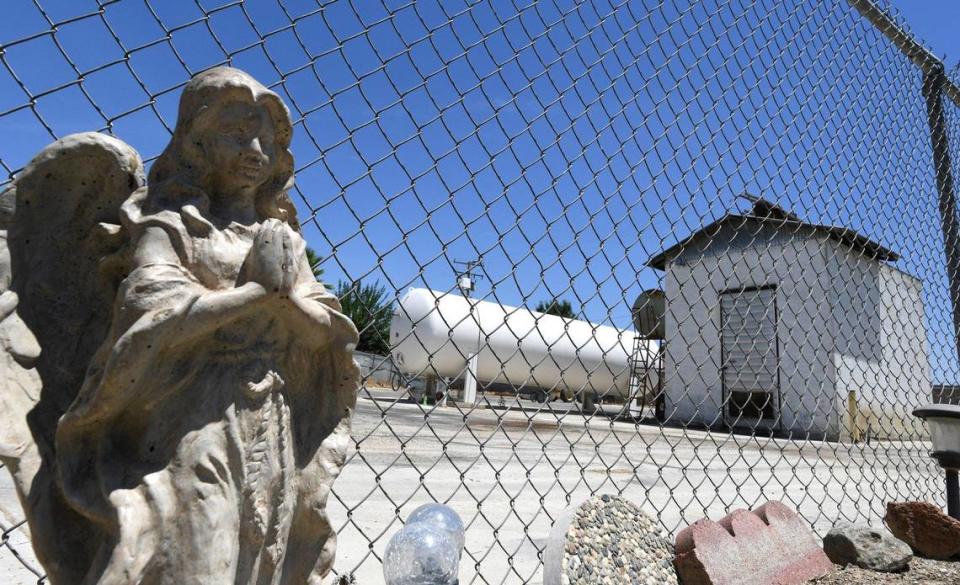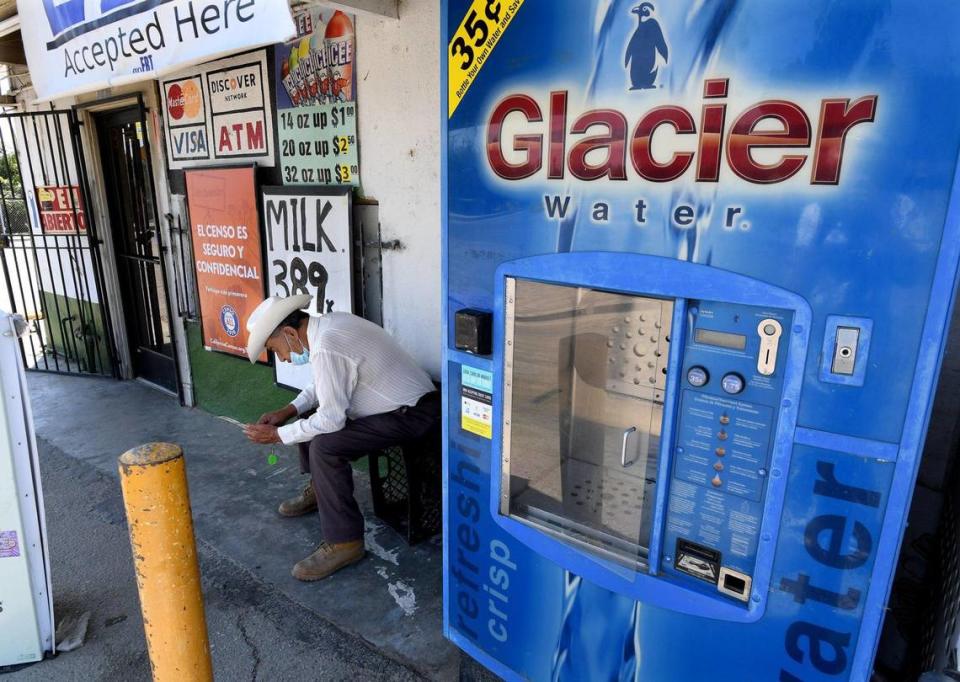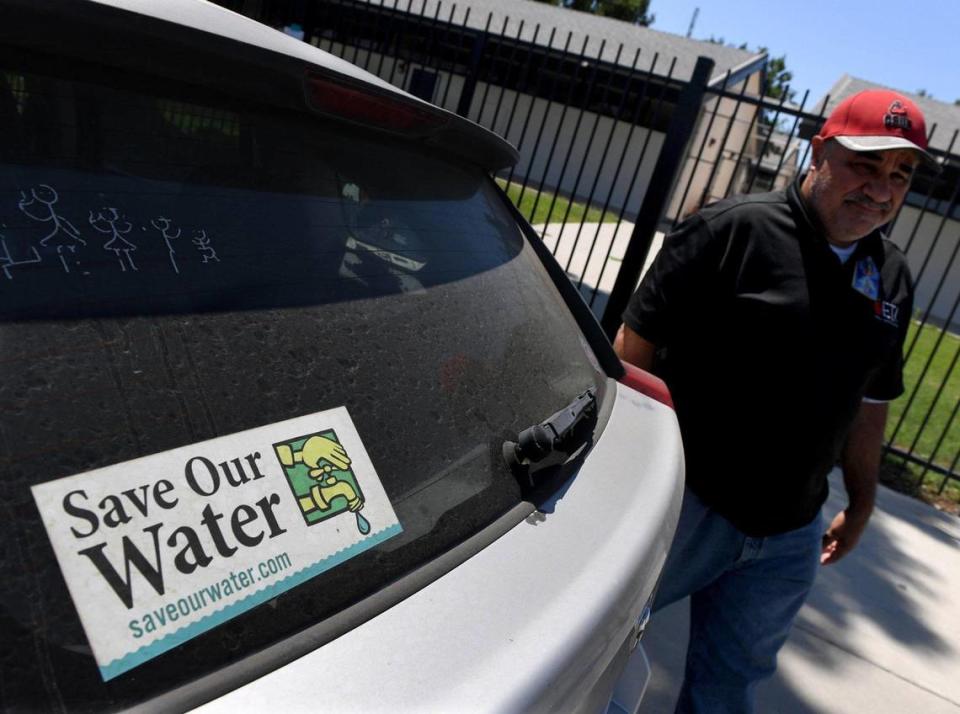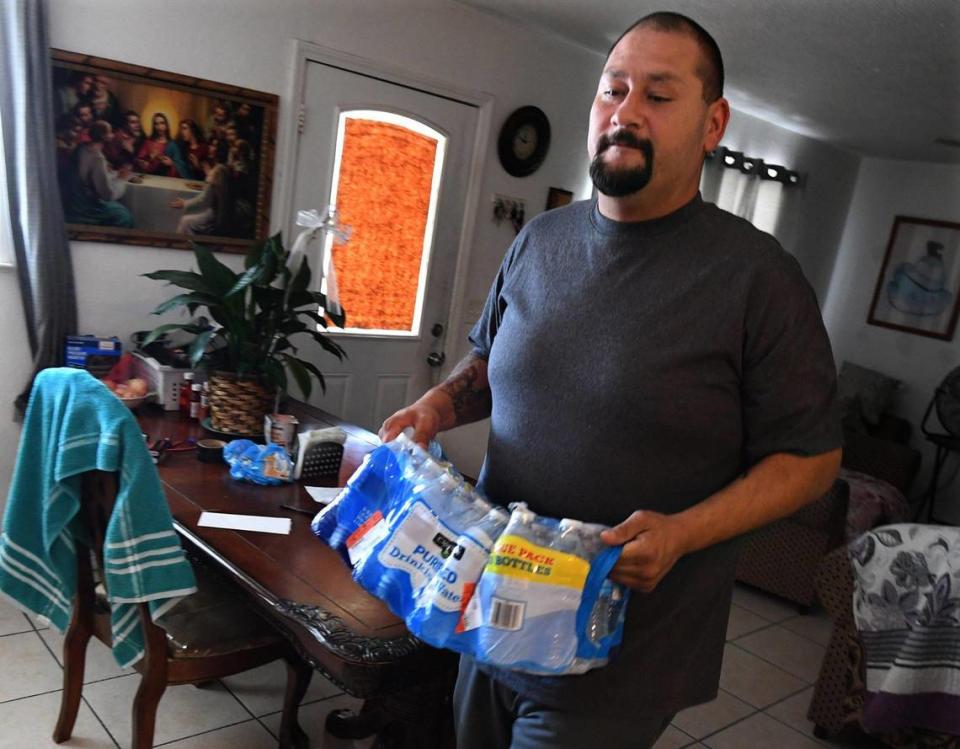What happens when a drinking water system fails? Ask this small California town
Residents in Earlimart, California, lost water service when a 50-year-old well on Mary Ann Avenue failed in late May.
When it came back on, the main source of drinking water for more than 8,000 residents became a well contaminated with a chemical from banned pesticides. And most residents didn’t know.
The Tulare County town’s water system is failing, in a lot of ways.
“I started noticing there was no water at all at certain times,” Arlet Garcia told The Fresno Bee. She couldn’t shower, wash dishes, flush the toilet or wash her hands in the midst of a pandemic and 100-degree heat.
“I would boil the water to cook something, and it had this scent, it was an awful scent,” Garcia said. “I don’t even use it to cook anymore. If I need to use water to cook beans or make soup, anything like that, I use bottled water. I don’t use the tap water because it’s bad.”
Garcia said she feels like she doesn’t know what’s happening with the water. She thinks the water district hasn’t been honest with customers.
Access to clean, safe and affordable drinking water is a human right in California. Yet, it hasn’t been consistent for years for the people of Earlimart, a predominantly Latino community where 40% of residents live below the poverty line.
And, it’s a similar story for dozens of other migrant-farmworker communities that rely on old infrastructure to pump dwindling and polluted supplies of raw groundwater to their homes and businesses in the Central Valley.
Old infrastructure and a legacy of TCP
The entire town relies on five wells run by the Earlimart Public Utility District for its water. Three of those wells meet state and federal drinking water standards. Without the Mary Ann well, there wasn’t enough capacity to meet the town’s demand.
The district has a staff of two to three people who work with less than $900,000 in annual revenues to run the sewer and water systems.
Staff and a three-person board of directors lean heavily on the direction of contracted engineer Dennis Keller of Visalia-based Keller and Wegley Engineering. At board meetings, they do what he recommends, according to a few residents who’ve been to a meeting and meeting notes obtained through a Public Records Act request.
When The Bee asked the district questions about the water system, a recent boil-notice, or the budget, the general manager said, “talk to Dennis.”
He said two of the wells are nearly 50 years old and two newer wells were on standby because they don’t meet basic water quality standards. They’re contaminated with 123-trichloropropane (TCP), which the state labeled a carcinogen decades ago.
Do you live in Earlimart? Here’s what you need to know about the water
TCP is a man-made chemical that was used in fumigant pesticides across the Central Valley until it was banned in the 1980s. It’s extremely difficult to degrade, so the chemical moved through the soil to the groundwater, where it’s remained ever since.
Earlimart residents drank water contaminated with TCP for years. A well on Clay Avenue supplied the town’s water until the state began regulating TCP in 2018 and ordered the district to put the well on standby.
The district has plans to drill new wells to replace the contaminated well and the old well and provide clean and more reliable drinking water, but those haven’t worked out so far.
In 2012, the district joined dozens of other communities that sued companies that sold products containing TCP, saying the companies “reasonably should have known that this harmful compound would reach groundwater, pollute drinking water supplies, render drinking water unusable and unsafe, and threaten the public health.”
In February 2019, the Earlimart Public Utility District agreed to settle the lawsuit with Dow Chemical Co., Shell Oil Co., Wilbur Ellis Company and others for $5.7 million, according to an agreement obtained by The Bee.
The district’s budget shows a line item for $3.8 million for a new well and 123-TCP treatment. The money hasn’t been used. The district is looking for a place for the well.
Failure at the well
Keller, the private engineer, wrote an application to the state in January 2019 for financial assistance to replace the Mary Ann well – the well that recently failed – saying it “has experienced difficulties associated with age.” In 2014, the district had applied for emergency funding for the same well because of falling water conditions “as a result of prolonged drought conditions,” the application says.
The district hasn’t yet heard back.
“In the meantime,” Keller told The Bee, “the pump in the well quit pumping.”

The broken infrastructure caused intermittent water outages, and residents were told to boil the water before drinking or cooking with it to kill potential bacteria. It cost people time and money as they sought clean drinking water for 10 days.
For 17-year-old Marissa Megrano, that meant her mom had to drive out of town to buy cases of bottled water for the family because the shelves in town were empty. Megrano lives with her mom, her sister and her sister’s daughter.
“Right now, it is hard to find water everywhere because of the whole coronavirus situation, especially in Earlimart because we don’t have many stores. We have to go to Delano,” Medrano told The Bee in a phone interview.

The boil-water notice was canceled June 8 after testing found there was no bacteria. But that didn’t mean the water was safe to drink.
Results from a water sample at the well on May 27, the day it was turned on, showed levels of TCP twice the state limit for safe and healthy drinking water, according to state records.
Bryan Potter, a state engineer with the Tulare District of the Water Resources Control Board, said it’s a public health priority to keep water running, even if it’s contaminated.
A lack of notice
Many residents are unknowingly showering, watering gardens and cooking with tap water that’s contaminated with a chemical that is unhealthy to drink or inhale.
Contact with TCP can cause irritation to skin or eyes. It can cause liver and kidney damage after long-term exposure. Studies have shown it can cause cancer in animals, and it’s believed to increase the risk of cancer in humans.
The Earlimart Public Utility District included a flier about TCP contamination in water bills sent out on June 26 to meet a regulatory requirement. But a lot of people don’t get water bills. Utilities are included in the rent.
Some residents never received the official boil notice and only learned their water might make them sick after Melissa Ruiz, principal of Alila School, posted a picture of the flier on the Earlimart Times Delta Online Facebook page.
The Earlimart PUD doesn’t have a website. It has a Facebook page that was last updated in early April to announce office closures as a result of the COVID-19 pandemic. Agendas and meeting notes are not online.
When the boil-water notice was in effect, the state water board’s Tulare District office received around 15 calls from Earlimart residents, including some who didn’t receive a notice, looking for information.
“I feel like there was a huge lack of communication on their part,” Ruiz said of the utility district, adding that, in general, the district doesn’t reach out to residents to get input on decisions.
Potter, the state engineer, said the Water Board is “following up with (the district) on their ability to communicate,” noting it could be a result of the district’s small staff.

Problems at the faucet
Problems with the water didn’t begin when the Mary Ann well failed.
More than 30 Earlimart residents reported issues with the water to The Bee through face-to-face and phone interviews as well as an online survey circulated in both English and Spanish on the town’s Facebook page.
Low water pressure is a fact of life. Sometimes there isn’t enough water pressure at Megrano’s home to take a shower. “Only a little bit of water comes out,” she said, so she has to wash her hair in the bath faucet.
Ruiz, who’s been principal at Alila School for five years, said sometimes the water pressure is so low that toilets at the school don’t flush. She didn’t notice how bad the pressure was until she moved outside of town and saw how fast the washing machine filled up.
“It was amazing, the difference,” Ruiz said.
The state engineer said he wasn’t aware of the problem. It’s possible it’s customer perception, Potter said, or the district might not be regularly checking the water system’s gauges to confirm it has good pressure.

The district is required to report to the state if the pressure drops below a certain amount, but it isn’t required to frequently test it throughout the system.
“If those aren’t getting reported, or those aren’t following up, that could mean they aren’t paying as close of attention as they maybe should be,” Potter said.
Half the population of Earlimart is foreign born; many others are lifelong residents. There is pride in the community – reflected in a new park and well-kept schools – made possible by bonds voted and paid for by residents.
“It’s a very tight-knit community. When we need to come together, we can. But it takes things to get really bad,” Ruiz said. “The water issue has been an issue for years. But I feel like now, because of the boil notice, people are taking more notice and they’re upset, and they want to get involved.”
Another woman, who asked not to be named, said “I have two children with skin issues and also myself. The water seems to make us extremely dry and itchy even while showering.”
Several responses to The Bee’s survey asked questions like, “When will we have safe water?” and “When are we getting clean water?”
For Ruiz, the biggest issue is that the sewer system has been at capacity for many years, halting all construction of affordable homes or new businesses.
“Our families want homes; they want that American dream. And without the ability to build here, families are moving out. Those are families that we’ll never get back,” Ruiz said. “It’s very sad.”
Earlimart is not alone
One of the most informed and involved community advocates about the water system is Abigail Solis. She grew up in Earlimart, is president of the school board and works for Self-Help Enterprises, a community development nonprofit.
Self-Help Enterprises and the State Water Board have been discussing how to help the community deal with the 123 TCP since the end of May.
She said the water challenges facing Earlimart are common in other small, disadvantaged communities in the central San Joaquin Valley.
“They’re reliant on old water systems, with old wells, that are producing contaminated drinking water. It’s one contaminant or another – nitrates, arsenic, chlorophenols – those are regular things we see in this part of the state,” Solis said in a phone interview.
It’s not an exaggeration to say contamination is a regular occurrence.
Of 300 water systems in Tulare County, Potter said 60 are contaminated with toxic chemicals at levels that violate state and federal standards for clean drinking water.
Tap water in the City of Tulare, for example, is contaminated with TCP, as is Elbow Creek Elementary School in Visalia, the community of Teviston and the Rodriguez Labor Camp.
Looking forward, Solis said, it’s crucial to have county and legislative representatives who will fight for communities’ drinking water.
“When you allow a community to drink contaminated drinking water, for decades, it makes us feel like we’re not important,” she said.
It’s not only representatives’ responsibility.
“The community needs to be engaged,” she said. “I want to encourage the community to keep fighting. To keep working at holding the PUD accountable. We need to be organized, we need to do our part to call attention to this issue.”
This story has been corrected to report when Solis learned about the contamination, which was around the end of May.
Fresnoland engagement reporter Dayana Jiselle contributed to this story.

